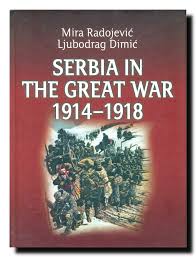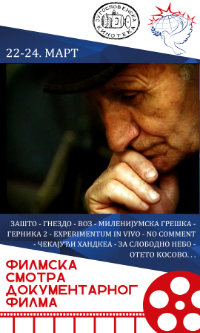Serbia in the Great War 1914 – 1918 - Lj. Dimic/M. Radojevic
| Activities - Books |

This publication is a special edition of the Belgrade Forum for a World of Equal Rights. The book is available in four languages, Serbian, Russian, English, German. The Belgrade Forum for a World of Equals is a non-governmental organization, the former Foreign Minister of Yugoslavia, Živadin Jovanović, presides. This group, which consists mainly of intellectuals, dedicates its main activity to the publication of publications with a focus on the Balkans and its history, maintains a homepage with current topics such. An award ceremony to Peter Handke, for example, regularly organizes conferences that are very well attended and supported by the participants' commitment. So z. For example, when all the events surrounding the 1999 war were documented, sharp statements against the war were published. B. also from the US side of Michel Chossudovsky.
The fact that the question of "war guilt", in this case the First World War, is again served with open audacity, has contributed to the topicality of this book. Especially loud is the drum of war guilt operated in Germany. It has also recently been reflected in an unspeakably manipulated European Parliament opinion aimed at Russia. But not only Russia, but also England are the focus. The ethnic wing of the AfD around Höcke operates the warm-up, probably for domestic political reasons and to collect voters.
Urgently enough, most urgently, that is, the votes of the Serbian historians from Belgrade. Mira Radojević and Ljubodrag Dimić devoted themselves with dedication to the presentation of the war background of the Great War of 1914-1918 against the Serbs. They hope that they will flow into the public, including those of the EU. However, Mira Radojević and Ljubodrag Dimić are aware that these voices are all too easily overwhelmed by the centers of political power that want to change the historiographical image of the First World War. The authors assume that recent history has been under attack for some time by a revisionist historiography. The revisionist "attack" denies facts and its attack on the scientific methodology makes the collective memory meaningless. How right they are ...
A look back: In 1999, when the hyenas had attacked Peter Handke with their tattered teeth, there were very few upright publicists in Germany. It was the time of mental-psychological preparation for the war. The 1999 war against Yugoslavia was short. After that the hyenas "calmed down", the prey was made, the stomach filled, the carcass lay in the burning sun, which lay mercilessly over Yugoslavia.
It was later too easily forgotten that even with this war the entire Balkans and its now fragmented territories became a defenseless victim of great power politics, which could now materially and institutionally dominate and order, as was fitting. And that's how it is today. On the agenda is the subjugation to allow self-determination is not up for debate. Who should "bind Serbia" to itself, Germany or France? If Austria does not want to play the role of a "primus inter pares" for the Balk Historical parallels are on the rise. The authors went deep into the history of the First World War, as revealed by numerous sources. Anyone who wants to subject his deeply rooted prejudices about the "Serbs" to revision will read the book. Anyone who does not consider this and wants to spit on the "Serbian nationalists" in the future - unfortunately will go down in history as ignorant. But there are many.
The presentation of the events begins with Serbia around the turn of the century - from the Berlin Congress to the assassination of Sarajevo. The Berlin Congress was the first open blow that directed German imperialism in its march to world power against the Balkan peoples, such. B. đorđe Stanković. (P. 11f.) But even the Habsburg monarchy was considered the "most dangerous enemy of the Serbian people and enemy of all Slavs". (15) In general, according to the authors, the presence of major powers not belonging to the Balkans resulted in a deepening of the conflicts, which were therefore more tragic. The love of depiction in detail proves to be beneficial, as the reader first gains an impression of which internal and external tears the Serbian people had to deal with. The strong intention of the Serbs was to establish a Serbian state, to unite the people of the Serbs. In order to prepare the Serbian people, as a state, for the twentieth century, the establishment of schools was seen as a suitable measure. A university was founded in 1867 in Belgrade, they wanted to educate an intellectual elite. The then Serbia was neither willing nor able to lead a war in 1914. However, the army's weakness and inadequate equipment provided an incentive for the enemies of Serbia. And so disaster took its course.
"The combination of the aristocratic-agrarian and industrial-bourgeois elites with the military and their efforts to preserve their position in German society struck also settled on the foreign policy level in the formulation of offensive goals and an orientation towards militarism. The Alliance "Manor" and "Blast Furnace" ... was the hard reactionary core that should play a key role in the events that led to the First World War ... ". (46f.) One could not better describe German militarism at the time when Fritz Fischer did it in 1979.
The Austrian nobility was also alarmed. He saw the "Slavic tidal wave" rise, they feared the "end of the Germans in Austria," said the German ambassador on the eve of the war. (53)
It would not do it justice, they tried to summarize the detailed and fact-rich presentation, the density of information in this book again. It becomes clear that the destruction of Serbia was of "vital interest" to the Habsburg monarchy. The fear of a convergence of the Serbian subregions was huge. A unified state, one nation was the genuine and unconcealed interest of the Serbs. They wanted to form a nation, with everything that belonged to it during that historical era.
About the assassination of Sarajevo, which represented the beginning of the Great War, there are probably countless variants. The core, however, is that the charges were directed against "... the Serbs ...". "The Serbs" it should have been until today. Until 1999, politics was against them and will probably continue to do so - secret service, military, economic, geostrategic.
To date, the Serbian government has no evidence of the assassination or its preparation. (84f.) The lies that Scharping, Fischer, Schroeder, and the Kohl government presented in the preliminary phase of the 1999 war come to mind. To the extent that the realities of the dismemberment of Yugoslavia are worked up and the masterminds named, in this measure can be a bit Show righteousness through the knick-hole. However, we do not have to wait for the current German government to acknowledge the breach of international law from 1999 - it will not do so, because as the "peace force" it wants to get a seat on the UN Security Council, and as the "peace power" new economic dependencies to participate in negotiations under a false sign, and in reality to earn more lush fillets / resources. China is in the door ...
A complicated interaction, also on diplomatic level carried out - there were also voices against the war - could not stop the declaration of war against Serbia by Emperor Franz Joseph. Serbia must die, behind this propaganda wave was the clear support of Berlin that Serbia must be eliminated as soon as possible as a political fact of the Balkans. (119) Chancellor Bethmann Hollweg declared in the Reichstag on 4.8.1914 that the war was not wanted. The German government had drawn up a white paper in August 1914, in which the documents were collected to prove the innocence of the Germans at the outbreak of the war. As early as the mid-20s, this work was regarded by some of the critical German public as the most hypocritical book on the outbreak of war. (121)
The never-ending massacre of hundreds of thousands of young men, starving and mutilated civilians was followed by the years following the entry into the war in 1914. A war such as the world had never seen before had begun. Germany was looking for a way to move east across the Balkans and Turkey. The Serbian people were slaughtered. Executions by the Austro-Hungarian army were the order of the day. Grace was harmful to such a population and severely punished. This ferocious cruelty called for a group of criminologists, including the Swiss physician and forensic scientist Archibald Reiss. In a report he collects the facts. The death style chosen by the executioners is very diverse
had been mutilated before or after her death; they were often stabbed, burned alive, stoned, their fingers or toes cut off, their breasts cut off, and babies thrown to the pigs for food. The report of Prof. Reiss caused horror in the civilized world. Henry Barbusse tried to express solidarity with the innocent victims by pointing out a series of individual crimes. The population, according to Barbusse, was driven mad by terror and fear. Even John Reed, who had come to Serbia several months later, came across the evidence and traces of these crimes. He confirmed the truthfulness of the findings of the Swiss doctors around Prof. Reiss: All of them were old men, women and children, against whom the Habsburg punitive expedition was organized. (149)
Serbia's state program in 1914 was to achieve a general consolidation of political and economic conditions. It would have taken decades of peace after the exhausting Balkan wars. A strong southwest Slavic state should emerge and Serbs, Croats and Slovenes should participate. Montenegro was also considered by Nikola Pašić as belonging to Serbia. But the war continued, and the book shows which fronts existed. For military historians interesting and novel insights into the war events of the First World War arise.
The war ended in 1918. The Serbs, Croats and Slovenes achieved the goals of the Kingdom of Serbia. The creation of the common state filled people with a pride that inevitably became mourning for human and material sacrifices. Serbia had lost 370,000 soldiers between 1914 and 1918. There were 114,000 war invalids recorded, another 630,000 people had died of hunger and disease and in the prison camps. More than half a million children were now orphans.
Photographs of the execution of Serbs by the Habsburgs ...
A soldier at the grave of his fallen son
The Balkans was and is due to its geographical location predestined to be victims of the great power interests. The breakthrough to the east earlier, a wall against Russia and China today. The Mediterranean must also be controlled, whether picturesque port cities hide NATO warships? New port extensions of NATO are planned. Camp Bondsteel had to be built as a strategic center. You do not have to know the intentions of the EU and the US in detail to guess that evil is again in action. In the name of a perverted morality, the next war should not be conducted. You will try it anyway. The book is an outstanding contribution against the historically, politically motivated revisionism, excellently written, with sources that leave nothing to be desired. Our respect!
Barbara Hug
| < Prev | Next > |
|---|
| Overstatement from Davos 2017. |
Liberal corporative capitalism, for reasons of lowering traveling costs, proposed not to travel to history alone but packed togather with NATO, EU and unipollar World Order. Workers participation has good chances to step in provisionally, buying time for full scale workers selfmanagment. |









